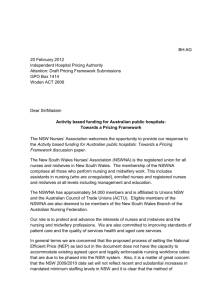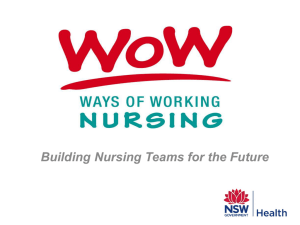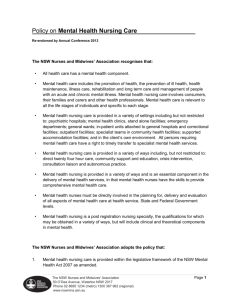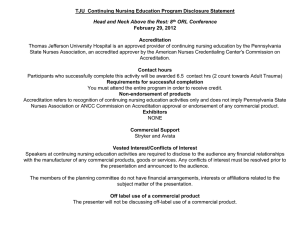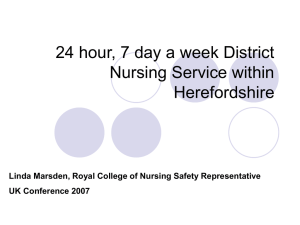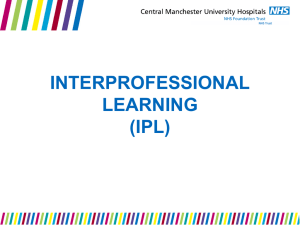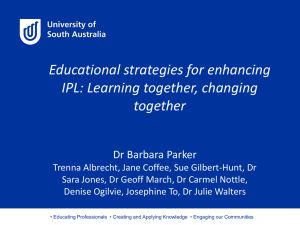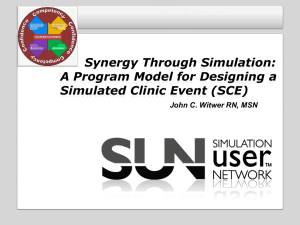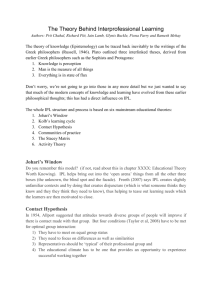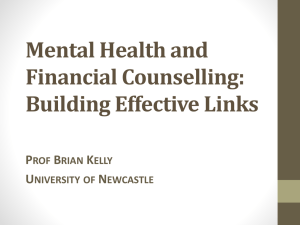Implementation and Evaluation of Interprofessional Learning in
advertisement
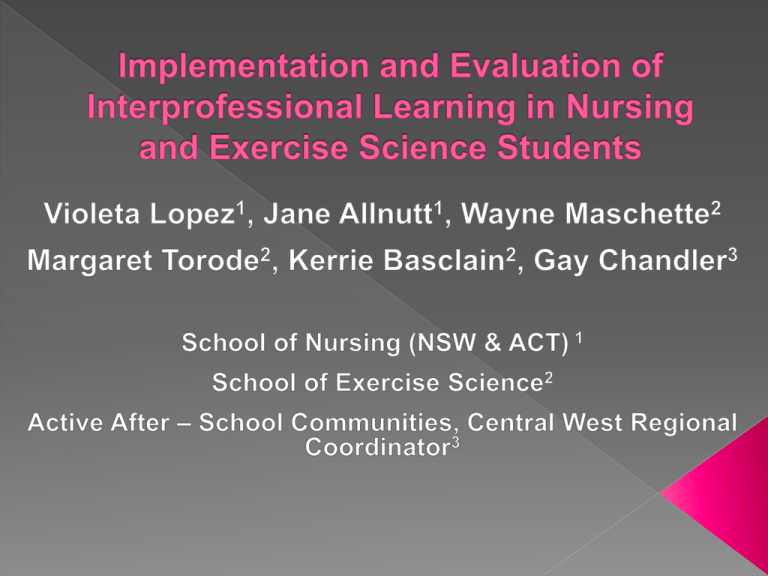
2006 Trip to Far West NSW to find clinical placements 2007 Established NSW Elective Nursing Unit NRSG206 Aboriginal Health Joint venture between ACU, North Sydney & The University of Sydney, Department of Rural Health (Broken Hill Campus) Provides an opportunity for students to engage in primary health care in a rural/remote Indigenous community Four week field trip to the Far West of NSW To implement and evaluate interprofessional learning in nursing and exercise science students during their Indigenous community field experience in Broken Hill & Far West of NSW The students will have greater shared understanding of the roles and responsibilities of each member of the team in providing health promotion activities among the Indigenous community and improve team function that could lead to more harmonious workplace relationships a method to enhance the ability of health professionals to learn to work together an approach to educating and training students & practitioners from different health professionals to work in a collaborative manner in providing client care multidisciplinary and interprofessional working is also currently a priority in healthcare policy increasingly adopted in North America, Scandinavian countries and Australia become actively engaged & develop ownership in the learning process integrate previous knowledge & experiences with new problems become more efficient at applying theory to practice concerns, enhance their problem-solving skills learn approaches that they can use throughout as process for life - long learning (Gonzales, Gangluff, & Eaton, 2004) Interprofessionals working together were found to be effective in empowering the residents of a community to identify their needs & take action to meet their needs (Lax & Galvin, 2002) In the United Kingdom, distinctive features of explanations in nurses’ and doctors’ consultations with patients were clearly identified. Nurses gave clear explanations of patients’ responsibility & behaviour while doctors gave explanations of biomedical interventions (Collins, 2005). • In Canada, promoting cultural competence in health care was also examined as a result of IPL showed that the pedagogical principles of IPL such as openness, mutual respect, inclusiveness, responsiveness & understanding one’s roles were fundamental to promoting cultural awareness among health professionals (Purden, 2005) 2008 • Negotiation with the Broken Hill Department of Rural Health, University of Sydney • Staff changes • Teaching semester clashes with Nursing & Exercise Science Project blocked 2009 • Collaboration with School of Exercise Science – School Principals in Broken Hill Project approved 2009 • IPL – Active After-School Communities Program • Venue of IPL – primary schools in the Far West of NSW • Nursing students’ placement – 4 weeks (August to September) • Exercise Science students’ placement – 1 week (September) • Nursing & Exercise Science students – cultural awareness workshop provided by Broken Hill Department of Rural Health Australian Government Initiative that provides primary school children with access to free, sport & other structured physical activity programs in the after-school time slot of 3.00pm to 5.30pm Aims to engage inactive children in sport & other structured physical activities through a positive & fun experience, develop a love of sport that inspires them to join a local sporting club Managed by The Australian Sports Commission - locally based regional coordinators Approximately 150 000 children participate in the AASC program, which is run in up to 3250 schools & after school care centres across every state and territory (http://www.ausport.gov.au/) Readiness for Interprofessional Learning Scale (RIPLS) Questionnaire ACU Field Experience Evaluation Participant Reflective Journal Face to Face Interviews of participants Only few students (n=6) were involved in the IPL due: to difficulty on arranging suitable dates difficulty in negotiating with school principals Comments from questionnaire: ‘Enjoyed shared experience’ ‘Could see the link between the two professions’ ‘Didn’t get to see the nurses in action’ ‘Didn’t know nurses did health promotion’ ‘Was great to mix and learn from another discipline’
